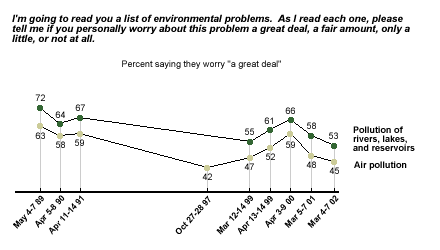It comes as no surprise that when presented with a list of specific environmental problems, the ones Americans say they worry most about are those with the greatest potential to have a direct impact on their health: air pollution and water pollution. More than four in five people (82%) currently say they personally worry a "great deal" or a "fair amount" about the pollution of drinking water, and 85% say the same about the pollution of water, lakes and reservoirs. More than three in four (78%) said the same about air pollution*.

The anxiety many Americans feel is manifested in their support for government measures to reduce pollution. At least seven in 10 saying they would favor higher pollution standards for industry (83%) and auto emissions (72%). In 1990, Americans seemed to believe that improving air quality was important, despite the high costs to the public and private sectors. When asked in a Gallup poll** that year if they would be in favor of "a new clean air law" that would cost business and industry an additional $20 billion on top of an existing $33 billion to comply with pollution laws and controls, 78% said they were in favor of such a law.
Americans' concerns over the long-term effects of air pollution are testament to the idea that scientific investigations have succeeded in convincing the public and lawmakers that it represents a serious health hazard. Clean air standards enforced by the Environmental Protection Agency (EPA) over the past 20 years have helped reduce air pollution in several U.S. cities. Still, a handful of these cities continue to exceed EPA limits in terms of fine particle emissions -- those emissions that come from the combustion processes in automobiles and industry.
In fact, the newest report on city air pollution in the United States asserts that fine particle air pollution increases the risk of death as a result of lung cancer and cardiopulmonary disease. This report, which has garnered significant attention from the media, was published in the March 6 issue of the Journal of the American Medical Association (JAMA). Researchers compared nearly 20 years of data on cancer mortality rates with data gathered from health records and air pollution data in 100 U.S. cities. Strong links between particulate air pollution and lung cancer mortality were detected, even after controlling for risk behaviors such as cigarette smoking and poor diet.
The JAMA study indicates that those who live in urban areas, where the long-term exposure to fine particulate air pollutants is greater, have a 20% greater risk of dying from lung cancer. Those nonsmokers who live in a household with a smoker and are exposed to long-term secondhand smoke run roughly the same risk.
Policy Proposals
President Bush's "Clear Skies" initiative, proposed by the White House in February, promotes efforts in the public and private sectors to reduce power plant emissions of sulfur dioxide, nitrogen oxide and mercury, but does not directly address carbon emissions from motor vehicles. That omission may come back to haunt the president: a month after Bush's decision not to limit carbon dioxide emissions in early March 2001, Gallup asked the public if it approved of his decisions***; 48% disapproved, while 41% approved. In another poll conducted around that time, the number of Americans in favor of setting higher auto emissions standards was 75%^, similar to the 72% in favor today.
With regard to "setting higher emissions and pollution standards for business and industry," support for such a measure is broad-based: 80% of Republicans (versus 88% of Democrats) and 76% of conservatives (versus 92% of liberals) say they would favor it*.
Especially for city dwellers and those in low-income groups, it's tough to be sure about the air and water quality. As the poll numbers indicate, the health of the rain forest and endangered species tend to be crowded off Americans' priority lists by concerns that directly impact the well-being of themselves and their families.
*Results are based on telephone interviews with 1,006 national adults, aged 18 and older, conducted March 4-7, 2002. For results based on the total sample of national adults, one can say with 95% confidence that the margin of sampling error is ±3%.
**Results are based on telephone interviews with 1,223 national adults, aged 18 and older, conducted April 5-8, 1990.
***Results are based on telephone interviews with 1,060 national adults, aged 18 and older, conducted March 5-7, 2001. For results based on the total sample of national adults, one can say with 95% confidence that the margin of sampling error is ±3%.
^Results are based on telephone interviews with 1,025 national adults, aged 18 and older, conducted April 6-8, 2001. For results based on the total sample of national adults, one can say with 95% confidence that the margin of sampling error is ±3%.